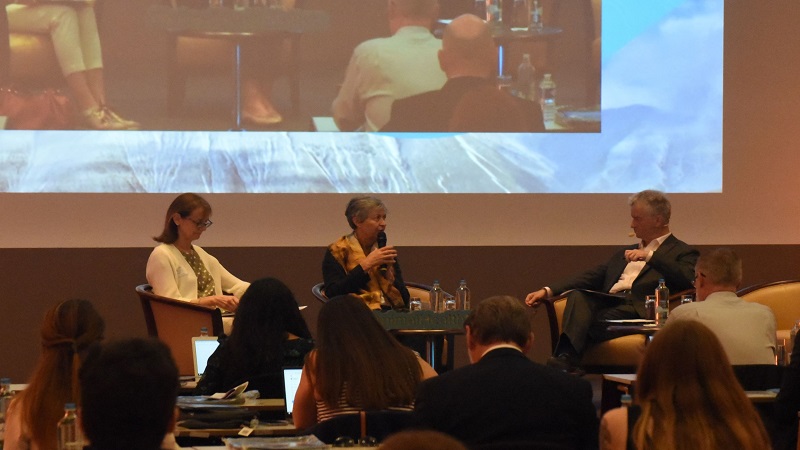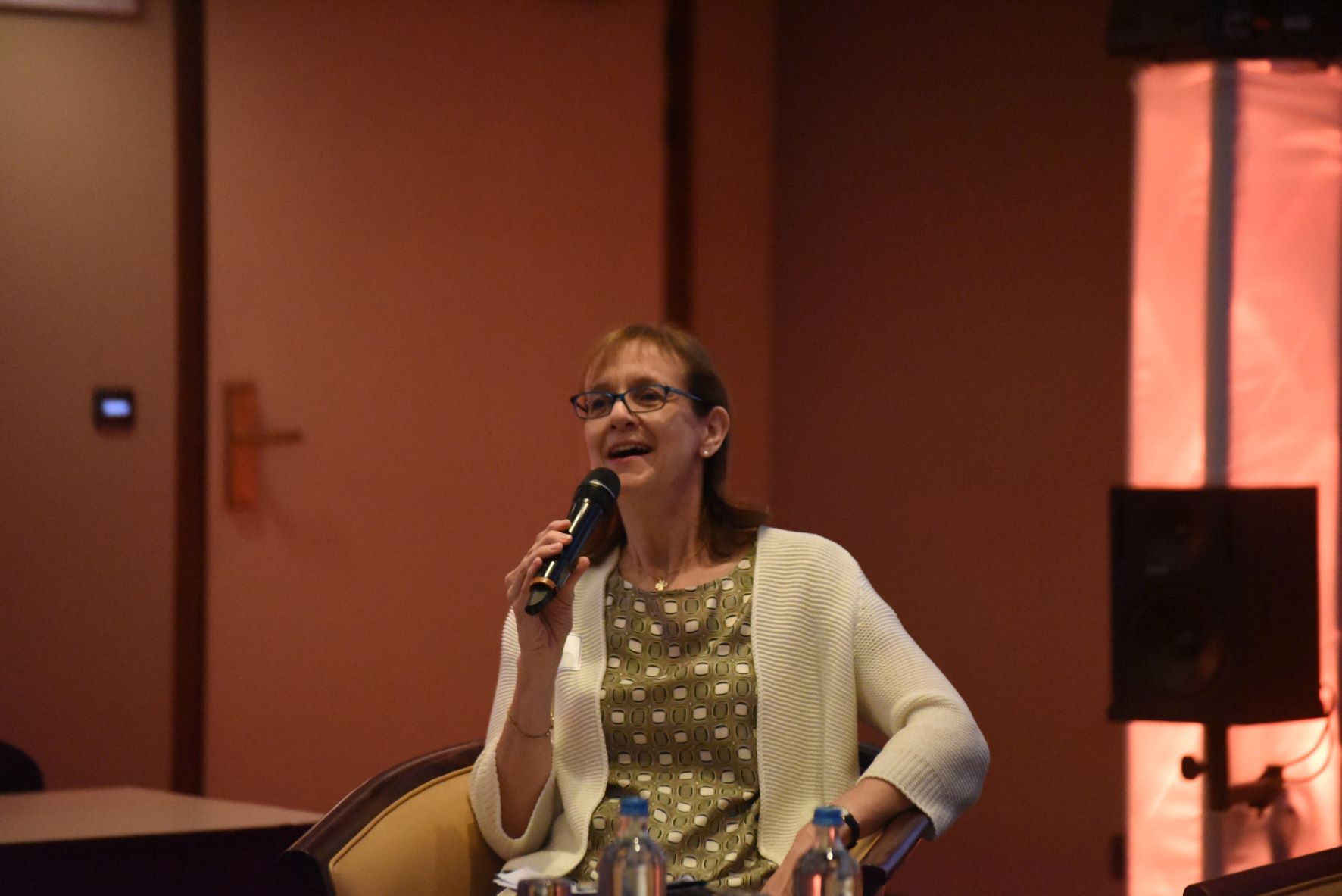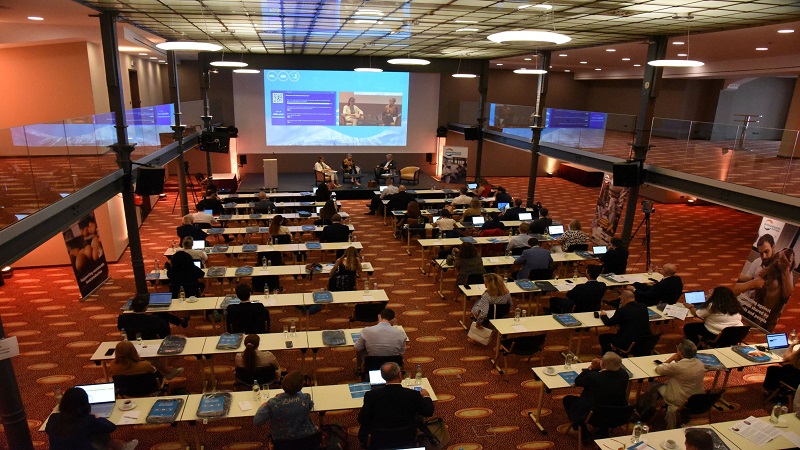One Health is an approach that brings together multiple sectors to achieve better health outcomes. The COVID-19 virus and what is sometimes called the ‘silent’ pandemic of antimicrobial resistance, has put the interconnection between animal, human and environmental factors into the spotlight.
AnimalhealthEurope has been banging the drum for a ‘One Health’ approach for many years. The links between human and animal health are very clear. It is estimated that more than 6 out of every 10 known infectious diseases can be spread from animals, and 3 out of every 4 new or emerging infectious diseases come from animals. At this year’s annual meeting, the organisation asked how that concept was being applied.

One Health: “It is not just an addition of policy, or additional expertise, it is about thinking differently, and really working together and thinking together.” Monique Eloit
“Five years ago, we already actually had a conference on One Health and the question was, is ‘One Health’ just the latest buzzword? We discussed what it meant and what it involved,” said Roxane Feller, Secretary General of AnimalhealthEurope. “Two years ago, the pandemic hit. I think we all became very aware of just how interconnected we are around the world, between humans, between humans and animals, and between humans and the environment.”
Director General of the World Organisation for Animal Health (WOAH, founded as OIE) Monique Eloit has strongly advocated in favour of a One Health approach. WOAH is working with the World Health Organization (WHO), the Food and Agriculture Organization (FAO) and - as of March this year - with the UN Environment Programme (UNEP) to develop a One Health Joint Plan of Action. WHOA will also shape the global accord on pandemic prevention. Eloit says that One Health isn’t just a matter of working together: “It is not just an addition of policy, or additional expertise, it is about thinking differently, and really working together and thinking together.”

"The Commission’s approach to antimicrobial resistance was a good example of a solid One Health approach" Claire Bury
Eloit underlined that there is not just one approach, and the response depends on the disease, available treatments, possibility for vaccination, economic considerations, and numerous other factors. The approach must also be flexible and adaptive to different ecosystems, including widely divergent local contexts. With rabies, for example, Eloit said that we have the tools, but that we must also need to deliver more financial support and political commitment.
Deputy Director-General, DG Health and Food Safety, European Commission, Claire Bury said the Commission’s approach to antimicrobial resistance was a good example of a solid One Health approach. To give an idea of the breadth of considerations, Bury said the Commission went well beyond a narrow approach and touched on animal welfare, biodiversity, soil health, sustainable use of pesticides and climate impact, among other issues.
Bury outlined how the Commission has teamed up with the European Environment Agency to establish a European Climate and Health Observatory to visualise the impact of climate change and related health risks and was also following the quadripartite work on the One Health Joint Action Plan, Eloit had described.
On 3 March 2022, the European Council adopted a decision to authorise the opening of negotiations for an international agreement on pandemic prevention, preparedness and response. The Council explicitly calls for an “One Health” approach.

"There’s no longer human health, animal health, but a genuine ‘One Health’ perspective.” Ludovico Sepe
A second panel discussed “The balancing act of public, animal and environmental health. How to translate this to policy?” Director for WHO Europe’s country health programmes Nino Berdzuli spoke about the quadripartite work which will, among other things, operationalise a partners platform this year, support several country projects, improve surveillance and establish a technical advisory working group to provide overall strategic guidance and help to operationalization the ‘One Health’ approach.
The One Health European Joint Programme, supported by the European Commission is already putting the approach to the test. Ludovico Sepe explained how the project brings different experts together: “We have experts in three fields, we sit together, we run the projects together, we make decisions together. We’ve reached a point where there’s a great understanding of the other’s point of view, there’s no longer human health, animal health, but a genuine ‘One Health’ perspective.” He said that more efforts needed to be made to other disciplines and that one problem within the academic community was the failure to give full recognition to cross-disciplinary work.
Aida Bakri, a Sustainability Leader, reflected on how the environmental element to One Health is the least integrated in current thinking and tends to be understudied and undervalued. A view that was echoed by Sepe.
Bakri and Andrea Bertaglio, a sustainability journalist, both underlined the importance of communication and the responsibility of journalists to provide accurate and well-informed reporting. Good communications are seen as an important way to help combat mis- or even dis-information.
Steve Hallahan from the European Platform for the Responsible Use of Medicines in Animals (EPRUMA) spoke about how good animal husbandry and nutrition could improve health outcomes, he widened the discussion to add that companion animals can boost human mental health and have a therapeutic value.
“Every euro invested, actually generates €5 of benefits for public health. We do not need to have €3 trillion lost, because of a pandemic.” Dieter Schillinger
The challenges faced in developing countries was highlighted by Dieter Schillinger, Deputy Director General of the International Livestock Research Institute, he offered a more global perspective based on his experience of working. His presentation revealed how thinking on the African continent because of the challenges faced meant that in some ways thinking is closer to a One Health approach.
Schillinger looked at the example of the Rift Valley Fever by way of example. The mosquitoes involved in this disease have been found in Europe, however there is already a risk assessment that aims to stop infected animals coming to Europe. A vaccine is being developed for animals and this can be adapted for human use. He also underlined the benefits of investing early: “Every euro invested, actually generates €5 of benefits for public health. We do not need to have €3 trillion lost, because of a pandemic.”
The morning’s discussions were rounded up by AnimalhealthEurope’s new president, Rob Kelly. He said: “Animal health matters because healthy animals can help us secure our collective future. With healthier and better managed animals, we can aim to reduce livestock emissions by 30%. With healthy animals, we can aim to reduce 20% of food production loss purely due to animal health disease, and with animal health and an increased focus on prevention, we can continue to reduce the need for antibiotics.”
AnimalhealthEurope represents companies that research, develop and manufacture veterinary medicines in Europe. It represents innovators and generics alike, as well as large, medium-sized and small companies. AnimalhealthEurope’s membership covers 90% of the European market for veterinary products
This content was commissioned by AnimalhealthEurope and produced by Dods
Sign up to The Parliament's weekly newsletter
Every Friday our editorial team goes behind the headlines to offer insight and analysis on the key stories driving the EU agenda. Subscribe for free here.